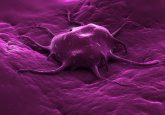Droplet-based surface-sampling MS system for identifying cancer

A novel surface sampling technology could help surgeons identify cancerous tissue on the operating table, according to a study published last month in Analytical and Bioanalytical Chemistry. Researchers from the Department of Energy’s Oak Ridge National Laboratory (TN, USA) and Brigham and Women’s Hospital, Harvard Medical School (MA, USA), reported an automated droplet-based surface sampling probe coupled to MS that could speed up biopsy analysis.
Currently, trained pathologists identify cancerous tissue by reviewing biopsies under a microscope. Traditional methods of diagnosis use immunohistochemistry to identify specific protein biomarkers. Despite the high degree of spatial recognition given by this technique, it is time-consuming and relies on the quality and specificity of the antibody used to detect the protein.
Various MS-based techniques, such as desorption electrospray ionization and rapid evaporative ionization MS, are currently being assessed for their utility in tumor classification and providing prognostic information. However, these MS methods can be limited to analyzing lower molecular weight biomolecules.
The new automated droplet-based surface-sampling HPLC-ESI-MS/MS system is not limited in this way. Vilmos Kertesz, who led the research from the Oak Ridge National Laboratory, commented on the significance of this: “The ability to quickly characterize the tissue distribution of larger macromolecular biomarkers like peptides and proteins would harness the diagnostic value of validated immunohistochemistry approaches for surgical decision-making.”
The research team indicated that the system has been applied successfully to spatially resolved sampling and detection of proteins from dried blood and drugs and metabolites from thin sections of animal tissue. They believe that the technology is simple, specific and rapid enough to potentially one day aid surgeons in detecting cancer from tissue biopsies.
Sources: Kertesz V, Calligaris D, Feldman DR et al. Profiling of adrenocorticotropic hormone and arginine vasopressin in human pituitary gland and tumor thin tissue sections using droplet-based liquid-microjunction surface-sampling-HPLC–ESI-MS–MS. Anal. Bioanal. Chem. DOI: 10.1007/s00216-015-8803-2 (2015) (Epub ahead of print); New tool on horizon for surgeons treating cancer patients.





